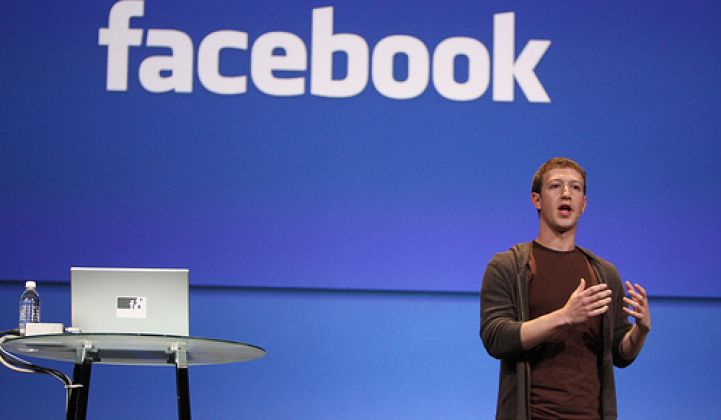Social networks have helped support political uprisings. Can they motivate people to change their energy consumption?
Facebook and the Cleantech Group are awarding $25,000 to one of Facebook's 1 billion users who develops the best Facebook application to encourage renewables, sustainability or energy efficiency. The winner also receives guidance from the Cleantech Group and Facebook on how to grow their idea.
The field has been narrowed to the following three finalists:
- SunFunder is a crowdfunding platform to finance off-grid solar projects like solar-powered lights or solar phone-chargers in developing countries for the more than 1 billion people without grid access.
- WattTime, with a team including programmers from Google and Climate Corporation, is trying to apply "principles of behavioral economics to motivate users to shift their electricity use to off-peak hours, when the electricity source is cleaner (e.g., wind and hydro vs. coal and gas)."
- Yerdle's Instant Share looks to enable a sharing economy on Facebook with friends issuing "give" or "want" lists. The goal is to make sharing as easy as ordering from Amazon.
Bill Weihl, Facebook's green guru, notes that, "Cleantech solutions require huge amounts of social collaboration -- and our three finalists cut across cleantech: from solar (SunFunder) to demand response (WattTime) to a great example of the emerging sharing economy (Yerdle's Instant Share). We've seen enormous creativity from all of the participants, and I look forward to learning the favorite from Silicon Valley's top investors and our live audience on March 20th at San Francisco Cleantech Forum."
As Katie Tweed has reported, Facebook has already teamed up with energy behavior analytics firm Opower and the Natural Resources Defense Council to develop a social media app that will allow participating consumers to benchmark their energy use against similar homes, compare usage with friends, enter energy-savings competitions and share efficiency tips.
Tweed reports that there's "a revolution afoot" in home energy management. Advanced learning-capable thermostats have become fetish items, and in some regions, residential demand response has become a necessary part of the demand response strategy, not just a footnote.
Energy usage that's subject to slight behavioral change is the sweet spot for social channels and energy apps. And one energy app designer will soon be $25,000 richer.
Greentech Media’s Networked Grid conference is set for March 19-21 and will feature Elisabeth Brinton of SMUD and Conrad Eustis from Portland General Electric Company, along with Seth Frader-Thompson of EnergyHub, Roy Johnson of EcoFactor and Yoav Lurie of Simple Energy, to talk about the challenges and promises of some of the latest methods utilities are using to reach, and impact, residential customers.



